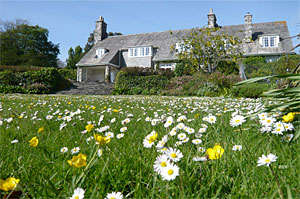Polly Tatum’s grandparents, David and Minnie Lamb, acquired Angus in 1938 when they retired from lifelong service in the Salvation Army. Minnie Lamb, a Cornishwoman, died there in April 1939. Polly was told by the late Shirley Allen (who lived for a time at Daymer House) that Angus was previously owned by two women who lived and ran a dame school there which he attended as a child. It is thought that in about 1910 it housed the foreman in charge of the building of Torquil, Daymer House and Daymer Bay House.

Eventually Angus was left to Polly by her aunt, Catherine Lamb, who was born in Hackney in 1890 and ‘retired’ to Trebetherick in 1951. She, too, had become a Salvationist, and as a devout Christian, she dedicated her life to helping those in trouble. Having been disabled by a serious illness in her youth she could only walk with the aid of two sticks. She dealt with her disability with fortitude and ingenuity and once said to Polly: “You know, I think God gave me my two sticks to enable me to do my work better”. After Catherine retired to Angus it wasn’t long before the call came to her to be helping people again. She became what was then called a ‘moral and social welfare worker’. Mrs Gold-Levin of the Daymer Bay Hotel became her driver when she needed to visit people in trouble in North Cornwall. Then Catherine acquired one of those pale blue three-wheeled electric cars for disabled people; she was allowed to have a little garage in the lane where it could be charged up overnight. She drove it all over Cornwall and became a member of the Disabled Drivers Association. One day she had a collision in the middle of Truro – the driver of the other car was none other than the Bishop of Truro. Although they served on a committee together, he had her up for reckless driving, which upset her.
Catherine Lamb had a devoted housekeeper, Edith Bradley, who had come to live with her many years before through the Salvation Army. She and Catherine became trusted caretakers of holiday properties in Trebetherick and looked after people’s houses when they were away. After Catherine’s death, Edith went to live at Greenbanks in Rock and later, when unable to look after herself, she lived out her days at the Salvation Army Eventide Home in Exmouth.
Catherine loved and was loved by children – she seemed to be able to love them unconditionally, despite being quite strict and commanding respect. Many children came to Trebetherick for the holidays and they all wanted to go and visit Miss Lamb – apparently some before they had even gone to the beach! Her Christian faith was a central part of her life and every Christmas she set up a crib in the hedge beside Angus’ garden gate. She used to amuse the family by singing with her ukulele; one of her favourite songs was
The Devil and me we can’t agree
Glory Hallelujah!
I hate him and he hates me,
Glory Hallelujah!
Catherine’s sisters, Meta Brauen and Jane Carton (Polly’s mother) were with her when she died at Angus in January 1968. She is buried at St Enodoc. Polly still has the cards of those who attended the funeral – so many names that bring back memories – Hocking, Male, Beason, David, Carhart, Hart, Garratt, Hawkey, Hewitt, to name but a few. Catherine had a great many friends. When Polly’s mother stayed with her once, she wrote down the names of all who had visited Angus in one week of summer – there were 100! John Betjeman was a frequent visitor and he and Catherine enjoyed theological discussions. After Catherine’s death, in a letter to Jane Carton he wrote “Trebetherick seems very lost without her . . .”
Polly and her husband Arlo were very sad to leave Angus – motivated in great part by the huge increase in traffic up and down the lane, the enlargement of the beach shop, the smell of fish and chips that pervaded the garden in the summer and the ‘security’ light from the shop that shone straight into the bedroom window and spoiled midnight walks to the beach.
Angus now belongs to David and Philippa Stevens. David’s associations with Trebetherick go back to childhood when his family spent summer holidays with the Sharpes next door at Torquil Cottage. David’s mother and ‘Cesca Sharpe were at school together in the 1930’s, and both their husbands were in the RNVR during the Second World War. Their children have put up a wrought iron gate between Angus and Torquil Cottage, with a Tudor rose and an anchor, to commemorate their parents’ long friendship.

